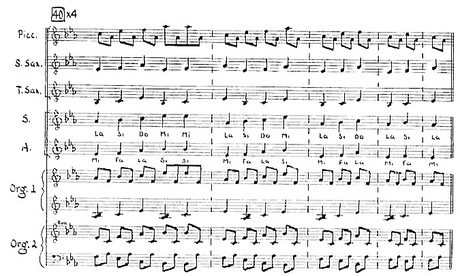And man, what a blast. Whenever I go through a piece of music I know well with the score for the first or second time, my opinion of the piece either rises or falls somewhat, depending on what I start to perceive in the piece once I fully realize what’s going on. Einstein was a vastly important piece from my youth, and while I always loved sections of it, my opinion of the whole has risen noticeably this week. (I had an opposite experience with Glass’s later opera The Voyage, a more tedious work than I’d remembered.) Today we went through the “Train” scene in about an hour and a half, and broke it down into an A A’ B A” B form – it’s the most complex scene from the opera, bringing together two of the recurring chord progressions (there are only about five in the whole four-hour work), as well as running ostinatos of different lengths together, Totalist style – which I may have to start calling Minimalist style. There’s a returning transitional passage (“x”) between the other sections, so it’s really A x A’ x B x A” x B, and the three A sections all fall into the same material after awhile, but start out with a different additive-process buildup. (The B sections recur in the final “Spaceship” scene.) In short, the form is both musically logical and satisfyingly intuitive. We had a similar experience with Reich’s Music for Mallet Instruments, Voices, and Organ, and I’m not even going to tell you where I got that rare score – one of the prettiest pieces ever made. Much as I love so much minimalist repertoire, I somehow don’t expect it to excel in the intuition department, and I’m being pleasantly surprised.
And now I’m pissed off as hell that I had to wait until age 52 to get a score to Einstein, a piece I’d been obsessed with since I was 22. I was wearing out my vinyl discs of this piece nonstop in 1978, and a score should have been available for sale at Patelson’s by 1980, so I could have learned all of Glass’s (and Reich’s) formal tricks before I embarked on my professional career. Instead, I find out that I correctly stole some of their ideas by ear, but there were some other neat formulas that I didn’t realize were there. It’s criminal that great music can’t pass in score form to younger composers within a few years. And it’s why I put nearly all my scores up as PDFs on my web site: I refuse to catapult any ideas out into the world without facilitating their immediate theft by young (or older) composers. I may not have any ideas anyone wants to rip off, but I’ll be damned if I’m going to squirrel them away out of reach.

